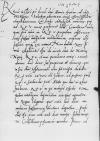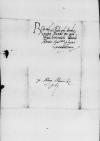List #2422
Łukasz GÓRKA do Ioannes DANTISCUSWłocławek, 1541-05-08
| odebrano Marienburg (Malbork), 1541-05-10 Rękopiśmienne podstawy źródłowe:
| ||||
Tekst + aparat krytyczny + komentarz Zwykły tekst Tekst + komentarz Tekst + aparat krytyczny
Reverendissimo in Christo Patri, Domino, domino
Reverendissime in Christo Pater, Domine, domine amice carissime et observantissime.
Salutem plurimam suique officiosissimam commendationem.
Cum mihi obtulisset nuntius, qui ad Reverendissimam Paternitatem Vestram meas perferret litteras, committere nolui, quin pro mea in Reverendissimam Paternitatem Vestram perpetua observantia eius felicem inviserem valetudinem, cupiens illi felicia quaeque ex animo. Non dubito Reverendissimae Paternitati Vestrae exploratum esse de morte olim domini
Cum vero nihil habeam ad praesens, quid Reverendissimae Paternitati Vestae scribendum putem, mitto, quae tunc in novis habeam, Reverendissimae Paternitati Vestrae in iis inclusis schedis. Ex quibus intelligere dignabitur ea, quae aguntur in
Profectus est paene iam ante duos menses filius meus dominus  BCz, 1597, p. 1202 serenissimum dominum
BCz, 1597, p. 1202 serenissimum dominum
Cuius favori et benevolentiae me commendo, cupiens semper illam felicem esse et incolumem, utque me Reverendissima Paternitas Vestra favore et benevolentia suis amplecti perpetuo dignaretur, parem vicem reddere de Reverendissima Paternitate Vestra studebo.
Datum
Reverendissimae Vestrae Paternitatis ad mandata


